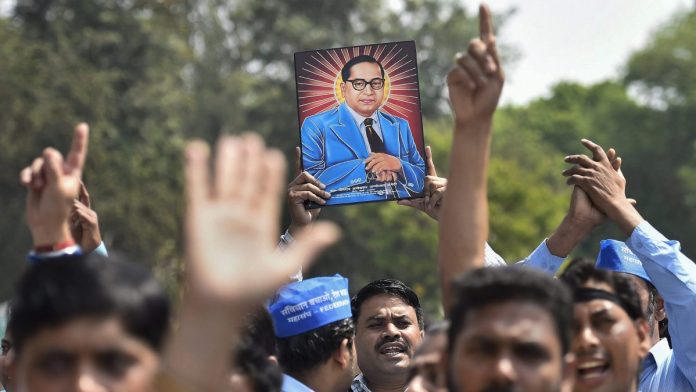Dr Ambedkar Was India’s ‘First Male Feminist’: Tharoor
Nov 19, 2022 | Pratirodh Bureau
FILE PHOTO: Members of the Dalit community display a portrait of Dr Bhim Rao Ambedkar during a 'Bharat Bandh' in New Delhi. Dr Ambedkar, as a legislator, fought for the rights of women workers and labourers, a remarkably feminist act 80-90 years ago
Dr B.R. Ambedkar was India’s first male feminist, who propagated such ideas decades back that they could be considered as progressive even for the current generation of politicians, Congress leader and writer Shashi Tharoor said on Saturday.
He was speaking during an interaction programme at the ongoing Goa Heritage Festival.
“He (Ambedkar) was probably India’s first male feminist. Way back in 1920, 30s, 40s, he made speeches, including in front of a female audience, which today would be considered as progressive for a male politician,” the Congress MP said while speaking about his latest book ‘Ambedkar: A Life’.
“He (Ambedkar) urged women not to allow themselves to be forced into marriage. He urged women to delay marriage, delay childbirth. He urged them to stand up to their husbands as equals,” the Thiruvanathapuram MP said.
Ambedkar as a legislator fought for women workers and labourers, he said, adding, “It was a remarkable feminist thinking of this man 80-90 years ago.”
He said, “There is a tendency to see Ambedkar as a Dalit leader. He was the principal Dalit leader of the country. From his early 20s, he was an influential voice and became more and more influential,” he said.
Ambedkar was an extraordinary Constitutionalist, being the chairman of the drafting committee. It was he who presented and defended every single one of the provisions of the Constitution, Tharoor said.
Responding to a question on India’s image globally, Tharoor said that in 1975, the country’s image in America was awful. “It was considered a poor country and people’s idea about India was about fakirs sleeping on nail-bed or snake-charmers doing road tricks. From there, the transformation has been astonishing. By the turn of the millennium, you have Indian software revolution and suddenly started imagining Indians as computer gigs (sic),” he said.
Tharoor said that the ‘Y2K’ phenomenon was a turning point for Indian computer professionals.
“There was a fear that all the computers would crash…Suddenly we had a demand for Indians doing codes to overcome that problem and that’s when India’s software revolution really took off,” he said.
According to him, the other thing that happened in the western world was about the consciousness of Indian expatriates as not just computer people, but engineers and doctors. “Indians, from being beggars and snake-charmers, were now software engineers,” he said.
Dr Ambedkar’s life is deeply inspirational. After graduating from Elphinstone College, University of Bombay, he studied economics at Columbia University and the London School of Economics, receiving doctorates in 1927 and 1923 respectively and was among a handful of Indian students to have done so at either institution in the 1920s.
In 1990, the Bharat Ratna, India’s highest civilian award, was posthumously conferred on Ambedkar. The salutation Jai Bhim (“Hail Bhim”) used by followers honours him. He is also referred to by the honorific Babasaheb, meaning “Respected Father”.
